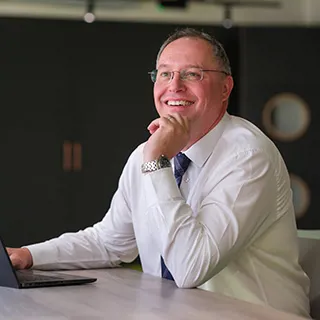Paul Prater
Published: Wed 29 Mar 2023
Published: Wed 29 Mar 2023
Paul Prater works for JN Bentley as a Mechanical Electrical & Process Lead Engineer where his day-to-day work ranges from developing strategies to being involved in design work and using his knowledge and experience to find solutions that work operationally and commercially.
Starting out as an apprentice, Paul quickly discovered how engaging and exciting the world of engineering could be and set himself on a career path that would cover both front-end client facing projects as well as the raw engineering work that he originally fell in love with. However, Paul’s STEM journey began during his childhood.
“My Dad inspired me to become an engineer, he worked as a steam fitter on the railway and eventually became a mechanical and electrical engineer. From an early age he taught me engineering skills, I still apply the techniques and attitude instilled by my dad even today.”

Now a parent himself, Paul has managed to find the balance of dedicating himself to both his family and his career and takes a proactive interest in his professional development.
After becoming an Incorporated Engineer Paul quickly set his sights on his next goal, becoming CEng. With 35 years of experience in engineering Paul certainly had the credentials and competence to apply for Chartership but it was a helping hand from the IET that enabled him take the plunge.
“I was contacted by Lucy Byrne, the Professional Registration Engagement Manger for the IET as the assessors had felt that my IEng application had also covered a lot of the criteria required for Chartership. She facilitated a session with a Professional Registration Advisor (PRA) who helped me identify areas where better examples of experience and competence were needed. Once I addressed these areas, I applied for Chartership.”
Paul was originally inspired to seek Professional Registration when he discovered that he didn’t need a formal degree qualification and could instead use his invaluable experience as a top engineer to demonstrate his ability.
“I found out I could do it by collating and evidencing the many years of experience I had behind me to prove that I was working at Batchelors and then master’s degree level. I mainly utilised the experience and skills gained over the last 10 years for my application but there will always be areas of knowledge that I feel can be strengthened and I’m always open to learning.”
On top of the support from the Professional Registration Engagement Team and his PRA, Paul also utilised the IET’s Career Manager tool which allowed him to “ensure all the relevant components of the application were in one place”.
With guidance from the IET and his own stellar career as evidence, Paul was successful in achieving CEng in November 2022.
One of the main motivations for becoming Chartered was Paul’s desire to see his extensive experience validated and offer him a chance to prove what he was capable of.
“I needed to have a credible assessment of my skills abilities and achievements against a defined benchmark that I could use to demonstrate my expertise and competence and Professional registration was just that.”
“You don’t need a formal degree to achieve Professional Registration, but you do need a thirst for engineering.”
Ever since achieving CEng Paul feels that he has got the rubber stamp on his career that he wanted, and that Professional Registration was a great way to show his ability, competence, and credibility.
“I now feel I can be looked upon as an expert in my field and I have the respect of my peers.”
Having been a member of the IET in one form or another since 1994, Paul was keen to offer advice to those looking to use the IET for support with Professional Registration and career development.
“The best advice I think I can give is, listen to advice and use the institution. There are many highly skilled engineers within the IET that freely give their time to advise people on how to achieve their goals. Utilise this great resource, take the advice given and implement it.”
However, Paul is not content with just giving advice but wants to actively help the next generation of engineers and technicians achieve the same level of success that he has and is doing so by working closely with his professional home for nearly 30 years; the IET.
“Working with the IET has inspired me to put something back into the institution and I am looking at getting involved in one of the various roles that help aspiring engineers achieve Professional Registration.”
Paul has used his achievements and experience to not only benefit himself but also future industry leaders and top-level engineers, however his definition of success was very clear.
“I think career success can be measured by the level of enjoyment you get from your role in engineering. It’s about being wanted and making a difference.”
Thanks for your patience. We’ve upgraded our systems, all part of our big picture plan to deliver a great experience for you.
Your log-in access has been reinstated for our websites and systems but should you encounter any issues, our Member Relations team is here to support you on +44 (0)1438 765678 or via membership@theiet.org.